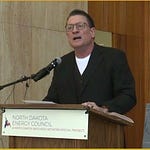In law and ethics, universal law or universal principle refers to concepts of legal legitimacy actions, whereby those principles and rules for governing human beings' conduct which are most universal in their acceptability, their applicability, translation, and philosophical basis, are therefore considered to be most legitimate.
Like many U.S. laws, there are ambiguous words and definitions that are open to interpretation. In South Dakota, there are some citizens who want to actually own their stocks, bonds and property rather than continue down the road of Uniform Commercial Code (UCC).
So what is the issue?
In South Dakota, it is property rights that are at center stage and very few people are aware of a significant threat to your IRA or 401(k) under current South Dakota law.
South Dakota House of Representatives Julie Auch, representing District 18, has introduced HB1199 to change the definition of “401K ownership” back to the owner.
That’s correct, according to the UCC, ownership of a person’s property is actually owned by another entity. Under laws in all 50 states what you actually own is a “securities entitlement.” This is a new form of “property ownership” that is more like a contract between you and your broker.
“So what, what I'm trying to do is protect South Dakotans 401k IRA,” Auch said. “May I please use your 401k and IRA to fund my loan? I mean, don′t you think they should even ask?”
For example, if you call your stockbroker to buy 100 shares of ExxonMobil or Apple you probably think that you own 100 shares in that company. You don’t.
“They actually changed the definition of what a stock and a bond, a mutual fund, I mean, it affects all securities,” Rep. Auch said. “And it was changed into something called a securities entitlement. And when we (South Dakota) changed the definition, we also changed how that will be owned or held, and instead of it being an ownership, it becomes a contract. And you and I both know, well, I mean, if you understand contract law.”
In South Dakota, they believe an individual should be able to own the actual stock or mutual fund you thought you purchased, rather than a securities entitlement.
“And, if the financial system faces a systemic collapse—think 2008 housing bubble but much bigger—nearly every stock and bond that is in electronic form will be taken as collateral by the largest ‘too big to fail’ financial institutions,” The Dakota Watchdog director Dustin Gawrylow wrote in his recent legislative update.
Gawrylow continued his analysis on the issue stating “this will happen without your knowledge and without any action or fault on your part—even if you are entirely debt free. If that sounds wrong, it’s because it is. It is also legalized fraud.”
So, how did we get here?
The Uniform Commercial Code (UCC), a state law passed in all 50 states was revised over 20 years ago to change how you own investment securities and to give certain banks access to your investment accounts if your stockbroker or your broker’s custodian files for bankruptcy.
“Imagine if a big bank went belly up in New York and your 401k is a pool of assets that's being used to collateralize that custodial bank that is using that big bank to finance them goes broke,” Auch said. “All your 401k is tied up in a bankruptcy proceedings that could take, it could take four, five, six, seven, eight, 10, 12 years before you could get at a penny of your money.”
According to Auch, all this shadow ownership is really happening without your knowledge or permission other parties have securities entitlements or rights to the investment account as well.
For examples, when the brokerage company borrows money from their bank, the assets of the borrower are pledged as collateral for the loan. But if the brokerage firm becomes insolvent, say due to a systemic financial crisis, a secured lender has priority over all of the accounts of the brokerage firm, including your 100 shares of stock.
“This cannot be written off as another conspiracy theory, this has been tested in court,” Gawrylow said. “The UCC has turned the concept of property rights upside down, but the UCC is also a state law and state legislators can take steps restore the rights of investors, or at the very least require informed consent.”
According to Auch, South Dakota HB 1199 takes an important step to restore and protect the investments for South Dakotans against the “too big to fail” financial institutions that benefit from the current law.
Since this law passed in all 50 states in the 1990’s, Auch was asked what can the average person do who wants to understand more about owning their 401K.
“If you want your 401K and property rights protected contact your legislators immediately,” Auch said.



















Did You Know You Don’t Own What You Think You Own in America?